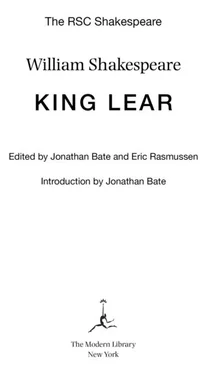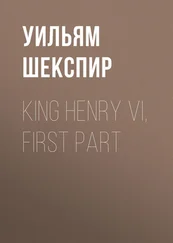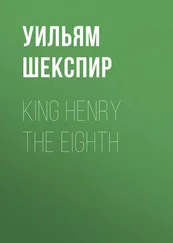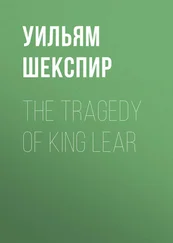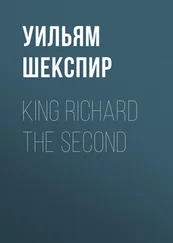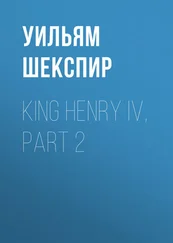уильям шекспир - King Lear
Здесь есть возможность читать онлайн «уильям шекспир - King Lear» весь текст электронной книги совершенно бесплатно (целиком полную версию без сокращений). В некоторых случаях можно слушать аудио, скачать через торрент в формате fb2 и присутствует краткое содержание. Год выпуска: 2011, ISBN: 2011, Издательство: Random House Publishing Group, Жанр: Старинная литература, на английском языке. Описание произведения, (предисловие) а так же отзывы посетителей доступны на портале библиотеки ЛибКат.
- Название:King Lear
- Автор:
- Издательство:Random House Publishing Group
- Жанр:
- Год:2011
- ISBN:978-1-58836-828-7
- Рейтинг книги:3 / 5. Голосов: 1
-
Избранное:Добавить в избранное
- Отзывы:
-
Ваша оценка:
- 60
- 1
- 2
- 3
- 4
- 5
King Lear: краткое содержание, описание и аннотация
Предлагаем к чтению аннотацию, описание, краткое содержание или предисловие (зависит от того, что написал сам автор книги «King Lear»). Если вы не нашли необходимую информацию о книге — напишите в комментариях, мы постараемся отыскать её.
King Lear — читать онлайн бесплатно полную книгу (весь текст) целиком
Ниже представлен текст книги, разбитый по страницам. Система сохранения места последней прочитанной страницы, позволяет с удобством читать онлайн бесплатно книгу «King Lear», без необходимости каждый раз заново искать на чём Вы остановились. Поставьте закладку, и сможете в любой момент перейти на страницу, на которой закончили чтение.
Интервал:
Закладка:
SCENE-BY-SCENE ANALYSIS
ACT 1 SCENE 1
Relationships between key characters are established. Several themes are introduced: power/authority, deception, nature, kinship, sanity, and sight.
Lines 1–33:Kent and Gloucester discuss Lear. Edmund is introduced. Gloucester insists that Edmund is as dear to him as his older, legitimate, son, Edgar, and claims that “the whoreson must be acknowledged.” The bawdy language used to describe Edmund’s conception undermines the good intentions behind this.
Lines 34–193:A trumpet flourish emphasizes the ceremonial, public nature of events from this point. Instructing Gloucester to fetch France and Burgundy, Lear reveals his “darker purpose”—to allocate a piece of kingdom to each of his three daughters, intending the “largest bounty” to whoever “doth love [him] most.” This reveals Lear’s inability to separate public and domestic and highlights his perception of emotions as subject to pecuniary measurement. Tensions exist between his love of power and his portrayal of himself as an old man who wishes to “Unburdened crawl toward death.”
Goneril’s speech is effusive but ambiguous, as she declares that she loves her father “more than word can wield the matter.” Regan is similarly flattering but ambiguous, telling Lear to “prize” her at Goneril’s “worth,” as she is “made of that self-mettle” as her sister. Cordelia’s asides show her dilemma—she is torn between genuine love for her father and reluctance or inability to voice this before the court. She is offered “a third more opulent” than her sisters—unlike Gloucester, Lear does not even suggest he values his daughters equally. In contrast to her sisters, Cordelia’s response is simply “Nothing.” Lear encourages her to say more, because “Nothing will come of nothing,” a concept that is explored throughout the play. Lear disinherits Cordelia, and Kent’s attempts to speak up for her fuel his anger.
Retaining a hundred knights, Lear divides his kingdom between Goneril and Regan, intending to live with each of them for alternate months. Kent intervenes, showing respect for Lear, but suggesting that he is not thinking clearly and urging him to “check / This hideous rashness.” Lear banishes Kent.
Lines 194–281:Lear explains to the King of France and Duke of Burgundy that Cordelia’s “price is fallen.” She is no longer “dear” to him, a word that highlights his belief that love is quantifiable. Burgundy cannot decide, so Lear offers his daughter to France but says he would not want him to marry a “wretch” that “Nature is ashamed” of. France asks what Cordelia’s “monstrous” offense is and she asks Lear to make it clear that it is lack of the “glib and oily art” of false speech. Burgundy says that he will take her with her original dowry. Echoing Cordelia, Lear declares that this is “Nothing,” so Burgundy declines. France sees Cordelia’s virtues and comments that “unprized precious” Cordelia is “most rich, being poor,” highlighting France and Lear’s differing perceptions of “worth,” and challenging Lear’s assertion that “Nothing will come of nothing.”
Lines 282–299:Leaving with France, Cordelia says goodbye “with washèd eyes,” suggesting tears but also clear perception of her sisters’ characters.
Lines 300–323:Goneril and Regan discuss Lear’s “poor judgement” and the “changes” and “infirmity” of his old age, but Regan observes that “he hath ever but slenderly known himself.” Goneril expresses concern about Lear’s desire for authority. Regan agrees that they must “think” about this, but Goneril says that they “must do something,” highlighting a subtle difference between them.
ACT 1 SCENE 2
Lines 1–22:Edmund is angry that he will not inherit. He protests about the label “base” and argues that he is as good as “honest madam’s issue”—better, even, because there was passion in his conception. He reveals his designs on Edgar’s inheritance.
Lines 23–107:Edmund conceals a letter from Gloucester in a way that draws attention to it. He tells Gloucester it is “Nothing,” but then pretends that it is from Edgar. Gloucester reads its contents, which suggest that Edgar and Edmund should murder Gloucester and split the inheritance. Edmund manipulates Gloucester, who is easily persuaded that Edgar is an “unnatural” villain. Edmund pretends to plead on Edgar’s behalf and arranges that Gloucester will overhear a conversation between them. Gloucester exits, blaming all the problems in family and state on “These late eclipses in the sun and moon.”
Lines 108–161:Edmund is scornful of those who believe that destiny is decided by the stars and blame their “evil” on “a divine thrusting on,” thus raising a debate between free will and fate, as he claims that the stars have no influence on his personality or fortune. Edgar interrupts and Edmund changes behavior on “cue,” suggesting his directorial role in the action. He persuades Edgar that Gloucester is angry with him and suggests that they avoid meeting. Giving Edgar the key to his lodging, he promises to help.
ACT 1 SCENE 3
Goneril and her steward Oswald discuss Lear’s irrational temper. She gives instructions to say that she is ill and cannot see Lear and that the servants are to ignore him.
ACT 1 SCENE 4
Lines 1–89:Kent is disguised, but while his appearance has changed, his nature has not—he is still an “honest-hearted fellow.” Not recognizing him, Lear employs Kent and asks Oswald for Goneril, but is ignored. One of Lear’s knights says that Oswald refuses to come back, that Goneril is unwell, and points out that Lear has been neglected recently. When Oswald reappears, he is disrespectful and Lear loses his temper. Kent trips Oswald up and insults him, earning Lear’s thanks.
Lines 90–174:Lear’s Fool delivers a series of jokes, riddles, nonsense, and rhymes. These have comic effect, but they are also ambiguous, providing perceptive comment on Lear’s circumstances and reinforcing some key themes such as cruelty, division, and folly. In the Quarto text, Kent comments that “This is not altogether fool my lord.”
Lines 175–297:Goneril lists her grievances. Lear’s temper and language become wilder, suggesting the growing disquiet of his mind. The interjections of the Fool, combining nonsense and wisdom, contribute to the growing disorder. Albany ineffectually attempts to calm Lear, who curses Goneril with either sterility or the future birth of a “child of spleen.” He leaves. Goneril ignores Albany, showing where the power lies in their relationship. Lear returns, having discovered that Goneril has reduced his train of knights by fifty. Despite uncontrollable anger, his tears suggest weakness. He decides to go to Regan, saying she will “flay” Goneril’s “wolfish visage”—an example of the animal imagery associated with the two sisters.
Lines 298–325:Goneril claims it is unwise to allow Lear to enforce the whims of his old age, and calls Oswald to take a letter to Regan. She criticizes Albany for his “milky gentleness.”
ACT 1 SCENE 5
Lear sends letters to Gloucester with Kent, then struggles against madness as he talks to his Fool.
ACT 2 SCENE 1
Lines 1–91:Edmund urges Edgar to escape, suggesting that Cornwall believes Edgar is plotting against him, and that Gloucester is in pursuit. Edmund directs Edgar’s flight, pretending that he is helping, but convincing Gloucester’s party that he is trying to stop him. He wounds his own arm and tells Gloucester that Edgar stabbed him when he refused to help Edgar. Gloucester tells “Loyal and natural” Edmund that he will make him his heir.
Читать дальшеИнтервал:
Закладка:
Похожие книги на «King Lear»
Представляем Вашему вниманию похожие книги на «King Lear» списком для выбора. Мы отобрали схожую по названию и смыслу литературу в надежде предоставить читателям больше вариантов отыскать новые, интересные, ещё непрочитанные произведения.
Обсуждение, отзывы о книге «King Lear» и просто собственные мнения читателей. Оставьте ваши комментарии, напишите, что Вы думаете о произведении, его смысле или главных героях. Укажите что конкретно понравилось, а что нет, и почему Вы так считаете.
